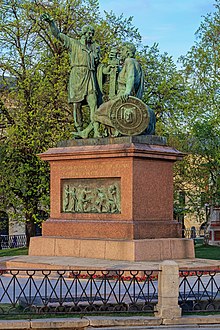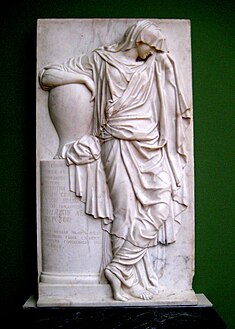You can help expand this article with text translated from the corresponding article in Ukrainian. (April 2021) Click for important translation instructions.
|
| This article relies largely or entirely on a single source. Relevant discussion may be found on the talk page. Please help improve this article by introducing citations to additional sources. Find sources: "Ivan Martos" – news · newspapers · books · scholar · JSTOR (April 2021) |
| Ivan Martos | |
|---|---|
| Иван Мартос | |
 Portrait by Alexander Varnek, 1819 Portrait by Alexander Varnek, 1819 | |
| Born | 1754 Ichnya, Pryluky Regiment, Cossack Hetmanate, Russian Empire (now Ukraine) |
| Died | April 5, 1835(1835-04-05) (aged 80–81) Saint Petersburg, Russian Empire |
| Education | Member Academy of Arts (1782) Professor by rank (1783) |
| Alma mater | Imperial Academy of Arts (1773) |
| Known for | Sculpture |
Ivan Petrovich Martos (Russian: Иван Петрович Мартос; Ukrainian: Іван Петрович Мартос; 1754 – 5 April 1835) was a Russian sculptor and art teacher of Ukrainian origin who helped awaken Russian interest in Neoclassical sculpture.
Biography
Martos was born between Chernigov and Poltava in city of Ichnya and enrolled at the Imperial Academy of Arts between 1764 and 1773. He was then sent to further his education with Pompeo Batoni and Anton Raphael Mengs in Rome. Upon his return to Russia in 1779, Martos started to propagate the ideas of Neoclassicism. He executed a large number of marble tombs, which are often regarded as the finest in the history of Russian art.
Enjoying the patronage of the Russian royalty, Martos held a professorship at the Imperial Academy of Arts since 1779 and became its dean in 1814. His main claim to fame is the Monument to Minin and Pozharsky on Red Square, conceived in 1804 but not inaugurated until 1818. Owing to the many years he spent on this one work, Martos did not produce much other sculpture in the period. He died at St Petersburg.
His later outdoor sculptures - those of Duke de Richelieu above the Potemkin Stairs in Odessa, Prince Potemkin in Kherson, Alexander I in Taganrog, and Mikhail Lomonosov in Kholmogory - became the symbols of those towns, although modern art critics often compare them unfavorably with his earlier, less bombastic works.
During the Soviet dictatorship Martos's memorial statues - including those of Nikita Panin and his family - were snatched from the cemeteries to be exhibited in the newly set up museums, while his colossal bronze statue of Catherine II, unveiled at the top of the Moscow Nobility Column Hall in 1812, was destroyed altogether.
Selected works
-
 Monument to Mikhail Lomonosov, in Archangelsk
Monument to Mikhail Lomonosov, in Archangelsk
-
 Monument to the Duc de Richelieu, in Odessa
Monument to the Duc de Richelieu, in Odessa
-
 Monument to Kuzma Minin and Dmitri Pozharsky, in Moscow
Monument to Kuzma Minin and Dmitri Pozharsky, in Moscow
-
 Headstone for
Headstone for
M. P. Sobakin -
 Headstone for
Headstone for
S. S. Volkonsk
External links
 Media related to Ivan Petrovich Martos at Wikimedia Commons
Media related to Ivan Petrovich Martos at Wikimedia Commons- "Biography". www.gov.spb.ru (in Russian). Archived from the original on 2003-03-11. Retrieved 2006-08-02.
- "Works in the Russian Museum". www.rusmuseum.ru (in Russian). Archived from the original on 2007-09-27. Retrieved 2006-08-02.
- "Duke de Richelieu Monument". 2odessa.com. Archived from the original on 2007-09-28. Retrieved 2006-08-02.
- Members of the Imperial Academy of Arts
- Academic staff of the Imperial Academy of Arts
- Imperial Academy of Arts alumni
- 19th-century sculptors from the Russian Empire
- 19th-century male artists from the Russian Empire
- Russian male sculptors
- People from the Russian Empire of Ukrainian descent
- Neoclassical sculptors
- 1754 births
- 1835 deaths
- People from Chernihiv Oblast
- People from the Cossack Hetmanate
- People from Kiev Governorate (1708–1764)
- Burials at Lazarevskoe Cemetery (Saint Petersburg)
- Ukrainian male sculptors